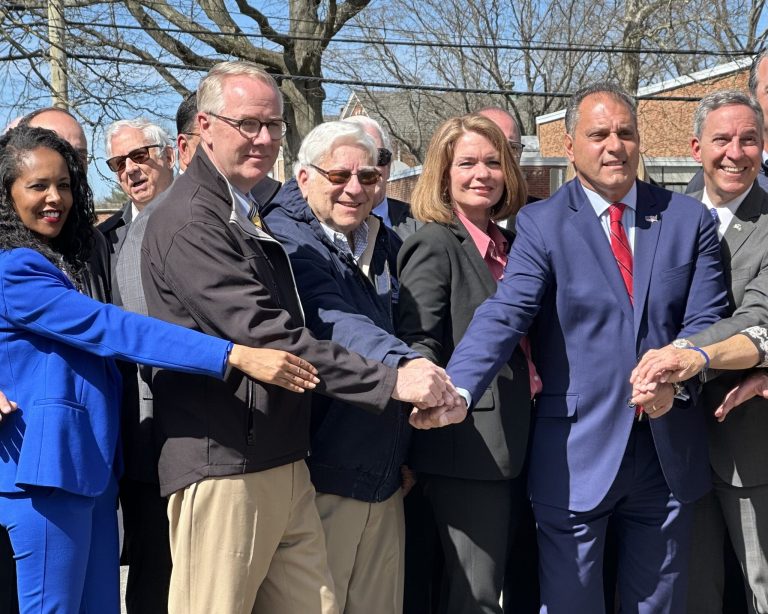
Nassau County’s three town supervisors rallied against the state government’s proposed bill that would override local zoning laws for religious institutions constructing affordable housing, calling it an attack on their suburban lifestyles.
“We’re here to say to Albany: Stop overriding our local government. Stop overriding our local zoning,” North Hempstead Supervisor Jennifer DeSena said.
New York State lawmakers have proposed a bill – referred to as the Faith-Based Affordable Housing Act – that would permit religious institutions like churches, synagogues and mosques to override local zoning laws if they build affordable housing on their properties.
The bill has been backed by a coalition of Black ministers, including those in Hempstead, who are advocating to remove the roadblocks against local zoning laws to allow for housing initiatives.
The rally at Herricks Park in front of the community center was held with a slew of local officials in support – including mayors, school board presidents, town supervisors, county legislators and state senators.
Leading the rally were the county’s three town supervisors – DeSena of North Hempstead, Donald Clavin of Hempstead and Joseph Saladino of Oyster Bay – advocating for the preservation of the suburbs they represent.
Concerns expressed by the speakers were about the impact of the faith-based housing initiative, citing population increases potentially affecting Long Island’s schools, environment, resources and property taxes.
School enrollment at North Shore school districts has been mixed in its rises and falls, with a little over half reporting drops in their student population from 2012 to 2023.
However, the total enrollment of the 13 North Shore school districts has dropped overall with a 0.05% decline, amounting to nearly 25 fewer students over the decade.
DeSena called the bill another “one-size-fits-all” housing proposal from the state government, comparing it to the governor’s housing proposal last year.
“This time it’s hidden behind religion,” DeSena said.
Last year Gov. Kathy Hochul proposed a housing plan in the state budget that called for a 3% increase in housing units over three years, with the possibility of the state stepping in if the 3% goal was not met, and the use of transit-oriented developments to achieve that objective.
It ultimately failed and was not adopted in the budget.
“And the idea of just repackaging it, putting on new wrapping paper and presenting it as a gift, we rejected the gift last year, two years, we reject it this year as well,” state Sen. Jack Martins said.
While the rally was held on the day of the solar eclipse, Clavin compared it more to Groundhog’s Day in the repetition of history as he said the state government continues to seek influence on Long Island’s housing.
Speakers continually stressed that the issue is not one of partisan politics.
“I didn’t ask for anybody’s card of their political affiliations standing here behind us,” Clavin said. “These are mayors, these are town supervisors, these are school board members who recognize the importance of development but development that fits the needs.”
All of the town supervisors, councilmembers, county legislators and state senators present at the rally were Republicans.
DeSena said the Town of North Hempstead and its neighboring towns are working to increase housing, but said it is being done “the right way” through local governance and community input.
She said housing development has occurred in Westbury and Mineola, many projects funded through New York State grants.
The town is in the process of updating its master plan, DeSena said, which would identify areas for further development as well as the necessary infrastructure to support it. This would encompass a series of community hearings gathering input on the town’s developmental initiatives.
Clavin said the Town of Hempstead approved “hundred” of housing units in the past year, but did not disclose the portion designated as affordable.
Saladino said the county is not against development but rather supports incentive-based solutions to erect more affordable housing on the island.
“While we don’t oppose reasonable development, we oppose this direct attempt to circumvent zoning laws,” Saladino said. “When you go around zoning laws, that means the public doesn’t have a say.”
Currently, faith-based housing is subject to local zoning laws and forced to be evaluated, and subsequently approved or disapproved by local governments if not complient.
While the bill would permit religious housing to be exempt from height, size and setback zoning regulations, the projects would still have to comply with other zoning regulations.
The state bill claims that religious institutions “run into zoning barriers” that restrict them from redeveloping their property to construct affordable housing. It states the law would provide“ a sorely needed public good” and bolster revenues.
According to Saladino, there are more than 1,100 religious institution properties in the county. He said many of them are located in residential neighborhoods.
The law mirrors one in California, where a bill passed in the fall that permits churches, synagogues and mosques to construct affordable housing on their property even if it contradicts local zoning.
Clavin said the governor’s office does not intend to include this bill in the budget, but attempts to move the legislation forward will continue.
The governor’s Long Island press secretary told Blank Slate that the bill was never proposed by the governor and is not in the budget.
In tandem with the faith-based affordable housing pursuit, Hochul said she is seeking a new affordable housing plan to build 15,000 units in high-cost areas of Long Island, New York City and Westchester County. This is being explored through the possibility of erecting housing on state-owned land in these areas.






